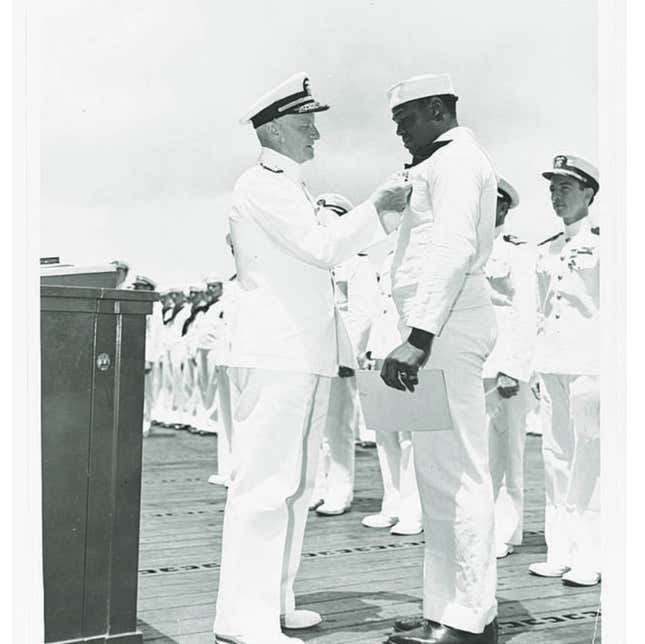
Black History Month is kicking off early this year as one of our lesser mentioned black American heroes gets honored by the U.S. Navy.
World War II hero and Mess Attendant 2nd Class Doris Miller will have a new aircraft carrier named for him according to the Honolulu Star-Advertiser. The announcement is expected to be made at Pearl Harbor on Monday which also happens to be Martin Luther King Jr. Day. (Woop woop!)
This will actually be the second warship to be named for Miller as he was previously honored when a Knox-class destroyer escort was named the USS Miller (FF 1091).
Some of you movie buffs out there may remember Miller as played by Cuba Gooding Jr. in the 2001 historical drama Pearl Harbor, but, outside of that film, I’m afraid he may be one of our black “against all odds” achievers who just doesn’t quite get the recognition he’s earned. So let’s fox that with a little history.
Doris “Dorie” Miller was the first African American to receive the Navy Cross for valor which he earned for manning a machine gun on the USS West Virginia and returning fire against Japanese planes during the Dec. 7, 1941 attack on Pearl Harbor.
The story goes: In 1941, Miller was 22 years old when he was collecting laundry the day an attack alarm sounded. His normal battle station in an antiaircraft battery magazine was destroyed by a torpedo and he went on deck and carried wounded soldiers to safety before receiving orders to aid his captain who had been badly wounded.
“He headed for his battle station, the antiaircraft battery magazine amidship, only to discover that torpedo damage had wrecked it, so he went on deck,” the Navy account states. “Because of his physical prowess, he was assigned to carry wounded fellow sailors to places of greater safety. Then an officer ordered him to the bridge to aid the mortally wounded captain of the ship. He subsequently manned a 50-cal. Browning anti-aircraft machine gun until he ran out of ammunition and was ordered to abandon ship.”
This was a big deal because, for one, Miller was not trained to operate the gun.
“It wasn’t hard. I just pulled the trigger and she worked fine. I had watched the others with these guns. I guess I fired her for about fifteen minutes,” Miller said according to Star-Advertiser.
Secondly, and more importantly, black soldiers weren’t allowed to man a gun in the Navy in 1941, according to Doreen Ravenscroft, a team leader for the Doris Miller Memorial.
“I think that Doris Miller is an American hero simply because of what he represents as a young man going beyond the call of what’s expected,” said Ravenscroft. “Without him really knowing, he actually was a part of the Civil Rights movement because he changed the thinking in the Navy.”
She added, “In the end, the fact that he didn’t think about what could be repercussions—that wasn’t a thought, when, at the time and in war, he did what was needed in his way to defend the United States of America.”
Adm. Chester W. Nimitz, the commander in chief of the Pacific Fleet, presented the Navy Cross to Miller in Pearl Harbor in May 1942. The following year, in November, Miller died while serving on a ship that was torpedoed by a Japanese submarine.

